Need to do more with live video? Not sure what to talk about when you go live?
To explore how to create live video like a pro, regardless of your personality, I interview Luria Petrucci on the Social Media Marketing Podcast.
Luria is a live video strategist and the co-founder of Live Streaming Pros. Her company helps creators and entrepreneurs create professional live video that's unique to them and their personalities. Her course is called Create Your Dream Video Studio.
Luria explains how to make the most of live video with different types of content and how to incorporate your personality into your live streams. She also reveals tips to make your videos look better.
Listen to the Podcast Now
This article is sourced from the Social Media Marketing Podcast, a top marketing podcast. Listen or subscribe below.
Where to subscribe: Apple Podcasts | Spotify | YouTube Music | YouTube | Amazon Music | RSS
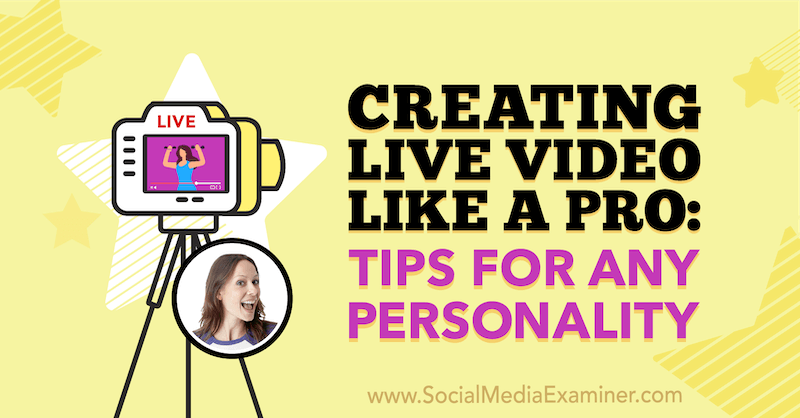
Why Live Video Right Now?
Live video allows you to connect with people on a much deeper level and enables you to create loyalty and trust much faster. It's the quickest way to connect with your audience and learn about them. They'll talk with you through live video in a different way than they will through email or recorded video.
People will show up for a live stream. If you're delivering value—if they want that information—they're going to show up because they know they'll be able to ask questions, talk to you, and hear your message in a more engaging way.
Especially during the times that we're in right now, people need connection, not perfection. As you begin live-streaming, it's important to just take positive action, get going quickly, and think about connecting with others instead of having everything perfect right off the bat—because life is life, and perfection isn't a thing.
The opportunities that exist right now to grow an audience, to transition and bring your current audience online, and the opportunities for the future are all so powerful. It's not just about surviving the here and now. When all of life gets back to “normal,” the future could hold some really big things for you if you start taking action today with live video.
To visualize this, if you're a yoga studio, maybe you've thought about doing live video in the past. Maybe you have some physical aspect to your business and you've never really done the work to get it online before.
If you do all of that now, then when things get back to normal, you'll still have the physical presence—the in-person location—but then you'll also have an entirely new revenue model. It's really exciting to see what people are doing to grow their businesses, not just for today but for the near future, as well.
While live video has been around for years, many people are just now beginning to realize its power. Everyone is getting used to going on camera, even if it's just Skype or Zoom. They're getting comfortable talking to a person or a small group over video so this is a great time to take the next step.
Get World-Class Marketing Training — All Year Long!
Are you facing doubt, uncertainty, or overwhelm? The Social Media Marketing Society can help.
Each month, you’ll receive training from trusted marketing experts, covering everything from AI to organic social marketing. When you join, you’ll also get immediate access to:
- A library of 100+ marketing trainings
- A community of like-minded marketers
- Monthly online community meetups
- Relevant news and trends updates
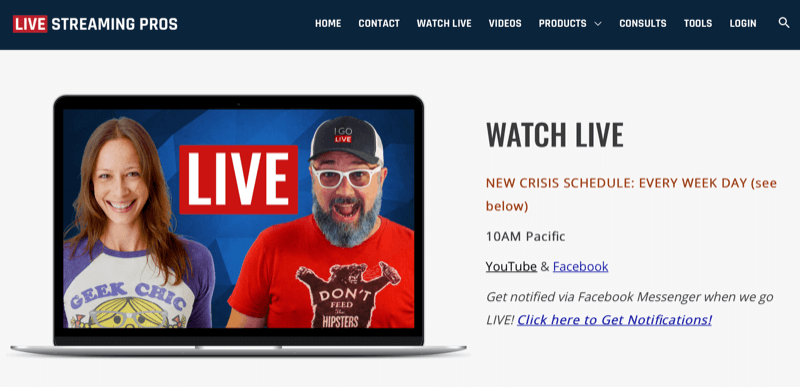
There's currently increased demand for guidance on live streaming. Luria's company used to go live twice a week, but now they're live 5 days a week providing extra training, bringing guests on, and doing Q&A's to show up for people in a much bigger way and help meet that demand. The kinds of questions that Luria's getting right now are completely different than they were before because there's a whole new audience for this information.
About Production Quality
People used to be intimidated by live-streaming tech—they felt like they had to replicate television-studio quality with their live streams. Standards have been lowered now, as we're seeing television presenters broadcasting from their homes with just their phones, and it just shows that anybody can do this.
Luria says that these massive TV studios using raw, from-the-phone video are thinking too big, to their own detriment. Her company, Live Streaming Pros, drills down the essentials of a TV studio and brings it all to people's home studios in a really simple way. She finds it hilarious that these huge companies can't figure out how to make their broadcasts look good from home. It's really not that hard but they just don't think that way.
Right now, everybody's taking action to get their broadcasts out there. It's great that they're just doing it and focusing on connection, not perfection. But soon, people will also start to understand the little things they can do to actually look like they did in the studio, and it will be an interesting transition.
Live Video Content: Value-Driven and Community-Driven Content
Live isn't going to go away, and as long as we're in a situation where we want to try to connect with people and it's not physically easy, there'll be opportunity. So a lot of people are sold on the value of going live but have no idea what they should talk about. Here's some inspiration for the kinds of things to share when you're live.
Luria sees two primary categories in content for live video: value-driven content, which is about helping somebody learn something or do something; and community-driven content, which is more about creating connection. With live video, you can do both at the same time but it's really valuable to actually split those two things up into separate types of streams.
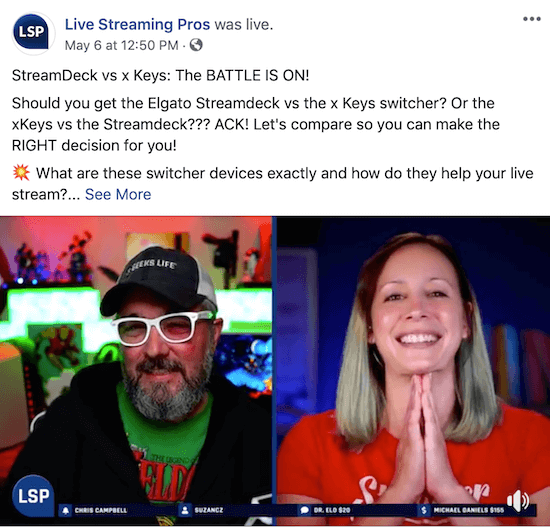
For a value-driven stream, you know what you're talking about, you have your bullet points, you know exactly what value that audience is going to get from you, and then you deliver that value in spades. You could have slides or a demo of some kind or you might just be informing people based on the questions you know they're going to ask.
Value, by the way, can come in many different forms—helping people, inspiration, entertainment—it doesn't just have to mean teaching something. You need to determine what your audience is going to find valuable.
Think about one quick win that your audience could achieve. If you're doing a video on the difference between Zoom and other types of software, for instance, you can show how and why they would use each option. You're not showing them all of the details of how to actually use each product; the quick win for them is just being able to understand which one they would want to use for which purpose.
Ask yourself three things before creating a value-driven video:
- What do they want to know?
- What do they need to know that they don't know that they need to ask?
- What do they not need to know? We know a lot more about our subject than our audience does in most cases. Remove extra information so you're really zeroing them in on the target quick win—you don't want to overwhelm them.
Luria uses a few different types of “show flow” regarding when and how she engages with her audience. Sometimes she pauses after each key piece of value to handle questions and engage with her audience. Sometimes she leaves Q&A for the end, especially if she wants to repurpose that content in the future. Either way, people love getting to talk to her and have their questions answered.
Every Friday, Luria does a live Q&A show where the main value proposition is that she's answering questions; she doesn't do anything but talk with her audience. She has a lot of fun engaging with people, dancing, playing music, and going down different conversational rabbit holes. It's all about engagement and connection, and it's much more relaxed.
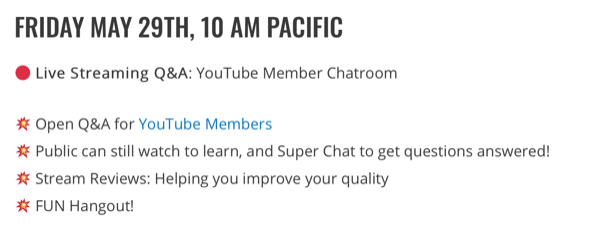
You can still do that in a more value-driven video but this type of community-driven content is much more engaging. You can actually put viewer comments up on screen, which makes people feel famous. You can also ask them questions.
One thing Luria loves to do in all of her streams is to ask if anybody's new. Then she gives those people a special shout-out. She thanks them for being there and that really starts to drive home the beginning of that very loyal relationship between herself and the viewer.
Luria cautions, though, not to go out and do Q&A's without knowing that you have an audience that will ask questions when they show up to your live streams. Getting no questions is really uncomfortable.
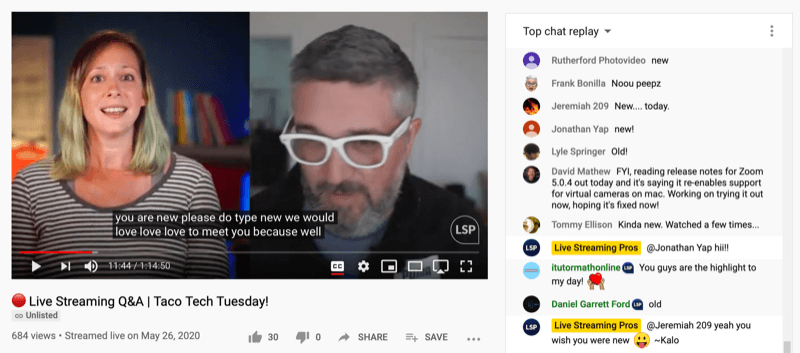
Try a hybrid model by starting out with a little value and then try out the community stuff at the end of the video. If that works well, you can ask people if they want more videos like that. Then invite them to it. You can also predetermine some questions by thinking about what people usually ask. You can do a Q&A that way where it's all planned and done beforehand.

Discover Proven Marketing Strategies and Tips
Want to go even deeper with your marketing? Check out the Social Media Marketing Podcast! Publishing weekly since 2012, the Social Media Marketing Podcast helps you navigate the constantly changing marketing jungle, with expert interviews from marketing pros.
But don’t let the name fool you. This show is about a lot more than just social media marketing. With over 600 episodes and millions of downloads each year, this show has been a trusted source for marketers for well over a decade.
Integrate Your Personality Into Your Live Video Content
One of Luria's favorite things to do is help people integrate their personalities into their content. Again, people want connection, not perfection.
Often, we don't understand why our audience would want to hear from us on another topic when they're showing up to listen to a particular value-add. Remember, we're also dynamic in our differences—perhaps you're a businessperson but you're also a mother, a runner, and a quilter—so don't assume your audience doesn't want to hear about all of that other stuff.
Harry Styles is a musician. He sings for a living and that's why people find him. That's the value that we get from him. But why do we care who he's dating? Why are there tabloids? Why are there conversations around what he ate for dinner and who he was hanging out with?
You're a celebrity—a micro-celebrity—when you create content online. You're creating content and people are looking to you for some value. As they get to know you, they want to know you. They want to know all of you and they want to understand who you are as a person.
Whether we're B2B or B2C, at the end of the day we're all human beings. People want to understand and feel connected to other human beings. When you integrate all of yourself, it builds trust, massive loyalty, and so much engagement.
Your life is your content. That's the hardest thing for people to embrace. But when you do and you look at your daily life, you start to think, “What would people find interesting about this?” You have to take yourself out of your own head to do this well, but once you get practiced at it, it will produce results.
What to Share About Yourself in Your Live Video Content
Luria has an exercise to help clients determine which parts of themselves to share publicly.
First, list all of the aspects of your life. For example, Luria does video and is a business owner—but she also has a Chihuahua. Additionally, she loves to hike, paddleboard, go to the gym, read, and do adult coloring books. Those are the shareable aspects of what she does in her life.
Write down your hobbies and passions, your pet peeves, your best traits, and your worst traits. As you're going through this, you may think, “I know all this stuff about myself”—but have you seen it all on paper? We live with ourselves day in and day out, and we don't necessarily think about the things that make us unique. Now you have a list that you can use for years to come.
Take one of those things from your list and weave it into your next live stream. Think about a story you can tell that supports the value that you want to deliver.
Let's say you love to hike and the value that you're there to give is three ways to train a dog. Open up the stream and say, “I'm going to teach you three ways to train your dog to do X, Y, and Z. I was out hiking the other day. It was a beautiful day. I was really out of breath because it was a super steep incline and I saw this person yanking on their dog. It was terrible! I couldn't believe the way they were treating this dog. That isn't how you train your dog. Here's how you do it instead.”
Tell the story around your feelings, your thoughts, and what you were experiencing.
You can also integrate your personality into community-driven content. Luria recently hired a new community-experience manager named Kali. Luria announced on her live stream that Kali had been hired and told everyone how she would be taking care of their community.
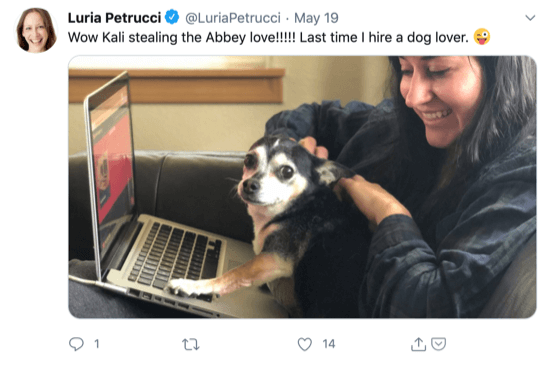
The audience didn't really know Kali at this point; she was a brand-new person in their world. So instead of giving them Kali's résumé, Luria talked about how Kali doesn't like black olives—and Luria's audience knows she loves black olives. Her audience also knows she likes garlic so she talked about how Kali—who's Italian just like Luria—does like garlic so they were geeking out about how awesome garlic is.
Then they talked about other little traits that Luria had discovered about Kali earlier in the day. The audience was engaged with all of it. Everybody was chiming in on these things that had absolutely nothing to do with Kali's job, and it caused them to love her automatically.
Food is always a winner for Luria in terms of engagement technique; people rally around food. That's how we connect with each other in person. Think about how you connect with people, and then just translate that to your online presence.
Tips to Improve Your Live Video Presentation
Look Like Yourself
A lot of people on video feel like they need to visibly tone down aspects of their personal presentation to appear professional. Luria says to kill that line of thought right now and just be yourself.
David, Luria's co-host and business partner, has multiple tattoos, wears white glasses, and usually wears Marvel shirts. From a physical perspective, he's all personality and he loves his geekiness.
Let your personality shine through. If you have tattoos, share them. If you love geeky t-shirts, wear them. Don't put on a dress shirt if that's not what you wear in normal everyday life. The discomfort that you experience will show up on camera, and it will be visible to your audience. They'll see right through it.
You don't need to look like the people on television. You need to look like you. People want to connect with you.
Create a Background
Luria absolutely loves to see personality in the background. The set itself, what's being seen in your background, can go a long way toward creating an environment that lets people automatically connect with you before you ever say a word.
David has lots of Marvel and Star Wars stuff in his background, and a whole lot of other props that show his personality. Luria has books that show her personality in her background. My Bourbon Journey on YouTube is one of Luria's favorite examples. The host's set is shelves and shelves of bourbon. It's beautiful and it immediately sets the tone of the video.
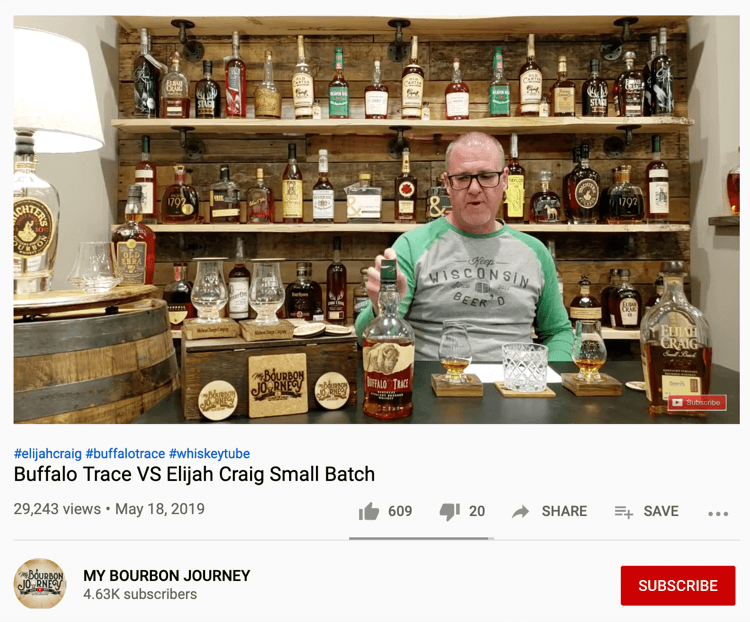
Go around your house and gather things that mean something to you and speak to your personality. Arrange them in a pretty way that frames you, as opposed to right behind you, where people can't see them. Remove the glass from any pictures to avoid glare.
You don't need a whole lot of space or equipment. You can get a ring light, a good camera, set up some things in the background, and you're good to go.
It's better for most people to set up one spot, whether at home or at your office (when we can go back to the office) so they can flip a switch and immediately get going, with no excuses not to shoot that video or go live. But if you're more mobile, you can just pick up the phone and go live wherever you are or where you want to be that day.
Take Control of Your Lighting
The more control you have over your light, the better. A lot of people try to use natural light, but it's hard to control. Use Luria's point about getting yourself set up so that you can flip that one switch and everything's ready to go. The more you can control your lighting instead of depending on natural light, the better off you'll be long-term.
A ring light can give you more coverage; it's meant to fill the lighting around your face. Your phone or camera can shoot right through the middle of it because it's an open ring. If you wear glasses, don't position the ring light right in front of you, because that will cause a lot of reflection—lift it up and point it down at you for the same effect without the glare.
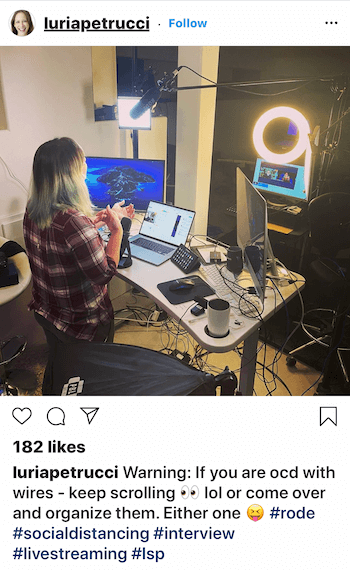
David has fancier lights to fill out his background but one of Luria's is just an Ikea floor lamp. She put a blue light bulb into it that shines up on the wall to separate her from her background for more perception of depth and visual interest. You don't need expensive equipment to create good lighting for your set; you just need to create interest.
Key Takeaways From This Episode:
- Find out more about Luria on her website.
- Follow Live Streaming Pros on YouTube.
- Take Luria's Create Your Dream Video Studio course.
- Check out My Bourbon Journey on YouTube.
- Sign up for the Social Media Marketing Society.
- Download the Social Media Marketing Industry Report.
- Watch exclusive content and original videos from Social Media Examiner on YouTube.
- Watch our weekly Social Media Marketing Talk Show on Fridays at 10 AM Pacific on YouTube.
Help Us Spread the Word! Please let your Twitter followers know about this podcast. Simply click here now to post a tweet.
If you enjoyed this episode of the Social Media Marketing podcast, please head over to iTunes, leave a rating, write a review, and subscribe. And if you listen on Stitcher, please click here to rate and review this show.
What do you think? What are your thoughts on getting the most out of live video? Please share your comments below.
Attention Agency Owners, Brand Marketers, and Consultants

Introducing the Marketing Agency Show–our newest podcast designed to explore the struggles of agency marketers.
Join show host and agency owner, Brooke Sellas, as she interviews agency marketers and digs deep into their biggest challenges. Explore topics like navigating rough economic times, leveraging AI, service diversification, client acquisition, and much more.
Just pull up your favorite podcast app, search for Marketing Agency Show and start listening. Or click the button below for more information.

